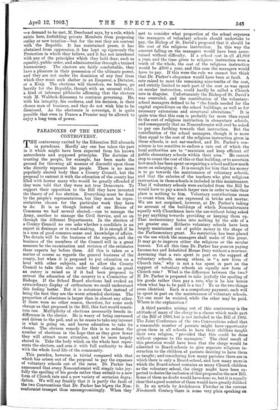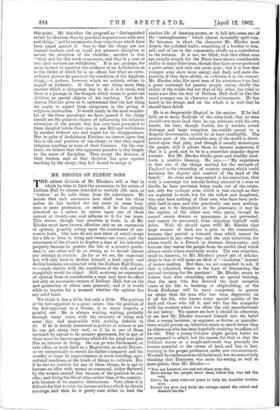PARADOXES OF THE EDUCATION • CONTROVERSY. T HE controversy excited by
the Education Bill abounds in paradoxes. Hardly any one has taken the part in it which might have been expected from his known antecedents and supposed principles. The doctrine of trusting the people, for example, has been made the ground for throwing all manner of discredit upon those who directly represent the people. There is no more popularly elected body than a County Council, but the proposal to entrust it with the education of the county has filled with horror many who would be greatly offended if they were told that they were not true Democrats. To support their opposition to the Bill they have invented the theory of ad hoc election. Everything must be done by the people's representatives, but they must be repre- sentatives chosen for the particular work they have to do. It is as though instead of one House of Commons we had several elected,—one to manage the Army, another to manage the Civil Service, and so on through the different Departments. In the election of a County Council no one asks whether a candidate is an expert in drainage or in road-making. It is enough if he is a man of good common-sense and knowledge of affairs. The details will be the business of the experts, and the business of the members of the Council will in a great measure be the examination and revision of the estimates these experts lay before them. All this is taken as a matter of course as regards the general business of the county, but when it is proposed to put education on a level with other subjects, and to allow the County Council to take this also under their charge, as great an outcry is raised as if it -had been proposed to entrust the education of the country to a Committee of Bishops. If the School Board elections had evoked an extraordinary display of enthusiasm we could understand this feeling better. But it is notorious that instead of being the best they are the worst attended elections. The proportion of absentees is larger than in almost any other. If there were no other reason, therefore, for some such change as that proposed in the Bill, this fact would consti- tute one. Multiplicity of elections necessarily breeds in- difference in the elector. He is weary of being canvassed and driven to the poll, and so he ceases to take any interest in what is going on, and leaves education to take its chance. The obvious remedy for this is to reduce the number of elections in the hope that as they grow fewer they will attract more attention, and be more largely shared in. Take the body which on the whole best repre- sents the electors, and arm it with full authority to deal with the whole local life of the community.
This paradox, however, is trivial compared with that which has arisen out of the proposal to pay the expenses of -voluntary schools out of the rates. Dr. Parker has announced that every Nonconformist will simply take joy- fully the spoiling of his goods rather than submit to a new form of Church rate and a new variety of sectarian degra- dation. We will say frankly that it is partly the fault of the two Convocations that Dr. Parker has blQwn the Non- conformist trumpet thus uncompromisingly. When they met to consider what proportion of the school expenses the managers of voluntary schools should undertake to pay, the Bishop of St. David's proposed that it should be she cost of the religious instruction. In this way the amount falling on the managers would have been ascer- tained without difficulty. If a school cost in all £1,000 a year, and the time given to religious instruction were a tenth of the whole, the cost of the religious instruction would be £100 a year, and this sum the managers would have to pay. If this were the rule we cannot but think that Dr. Parker's eloquence would have been at fault. A rate raised to meet the remaining nine-tenths of the cost, and strictly limited to such part of the cost as was spent on secular instruction, could hardly be called a Church rate in disguise. Unfortunately the Bishop of St. David's was overruled, and the contribution of the voluntary- school managers defined to be " the funds needed for the capital expenditure on the school buildings, as well as for necessary extensions and structural alterations." It is quite true that this sum is probably far more than equal to the cost of religious instruction in elementary schools, and consequently that no Nonconformist will ever be asked to pay one farthing towards that instruction. But the contribution of the school managers, though it is more than equal to the cost of the religious instruction given in those schools, is not ear-marked, and Dr. Parker's con- science is too sensitive to endure a rate out of which the local authorities are to "maintain and keep efficient all public elementary schools within their area." He cannot stop to count the cost of this or that building, or to ascertain how much has been spent on repairing a school and how much more on enlarging it. It is enough for him that his money is to go towards the maintenance of voluntary schools, and that the salaries of the teachers who give religious instruction in these schools is included in this maintenance. That if voluntary schools were excluded from the Bill he would have to pay a much larger rate in order to take their place is nothing to him. Voluntary contributions cease to count when they are expressed in bricks and mortar. We are not surprised, however, at Dr. Parker's taking no account of the buildings of which Nonconformists equally with Churchmen have the use without being asked to pay anything towards providing or keeping them up. That inconsistency fades into nothing by the side of a, yet greater one. Hitherto voluntary schools have been largely maintained out of public money in the shape of the Parliamentary grant. No restriction has been placed on the use which the managers shall make of this grant. It may go to improve either the religious or the secular lessons. Yet all this time Dr. Parker has gone on paying Income-tax and Inhabited House Duty without a murmur. Assuming that a rate spent in part on the support of voluntary schools, among others, is " a new form of Church rate," why is not a tax spent in part on the support of voluntary schools an equally new form of Church rate ? What is the difference between the two ? If Dr. Parker is prepared to take joyfully the spoiling of his goods rather than pay a rate, why is he less heroic when what has to be paid is a tax ? To us the two things seem identical. Each is a compulsory payment, each will be spent in part on the maintenance of voluntary schools. Yet one must be resisted, while the other may be paid. Where is the explanation ?
A third paradox arising out of this controversy is the attitude of many of the clergy to a clause which made part of the Bill of 1896, but is not included in the Bill of 1902. The Joint Conference of the two Convocations asked that a reasonable number of parents might have opportunity given them in all schools to have their children taught their own religion, " provided that this could be done without expense to the managers." The chief result of this provision would have been that the clergy would be admitted to Board-schools to give separate religious in- struction to the children of parents desiring to have them so taught; and considering how many parishes there are in which there is only a Board-school, and how many more in which the Board-school contains as many Church children as the voluntary school, the clergy might have been ex- pected to desire the inclusion of this proposal in the new Bill. Some of them no doubt would have done so, but it is equally clear thata good number of them would have greatly disliked it. In an article by Archdeacon Fletcher in the current Nineteenth Century thcre is some very plain speaking on this point. He describes the proposal as " distinguished rather' by idealism than by practical acquaintance with men and things," and he enumerates four objections which have been urged against it. One is that the clergy are not trained teachers, and so could not preserve discipline or secure the attention of the children ; another is that " their zeal for this work evaporates, and that in a year or two their services are withdrawn." It is not, perhaps, for mere laymen to question the evidence of an Archdeacon as to the Order of which he is an • officer, but what an extra- ordinary picture he paints of the condition of the Anglican clergy,—a picture, however, which we entirely refuse to regard as• authentic. If there is one thing more than another which a clergyman has to do it is to teach, and there is a passage in the Gospels which seems to point out children as special objects of his teaching. Yet Arch- deacon Fletcher gives us to understand that the last thing we ought to expect from clergymen is the giving of religious instruction. It would surely be the most wonder- ful of the three paradoxes we have named if the clergy should see the greatest chance of influencing the religious education of the people that has ever been presented to them dangled before their eyes in one Bill and withdrawn by another without any real regret for its disappearance. But in spite of Archdeacon Fletcher, we cannot agree that this is the real position of the clergy; or that they regard religious teaching as none of their business. On the con- trary, we believe that this apparent paradox is due largely to the sense of discipline. They accept the decision of their leaders, and as that decision has gone against teaching by the clergy, they feel bound to accept it.











































 Previous page
Previous page